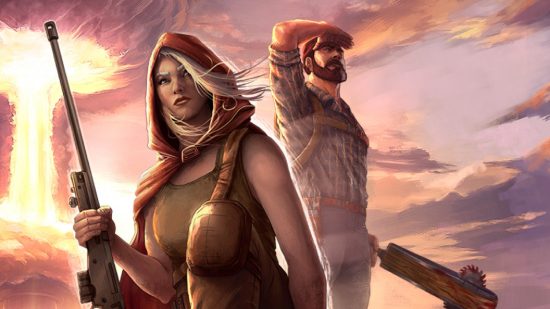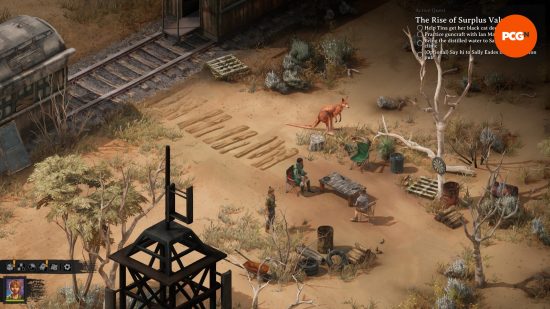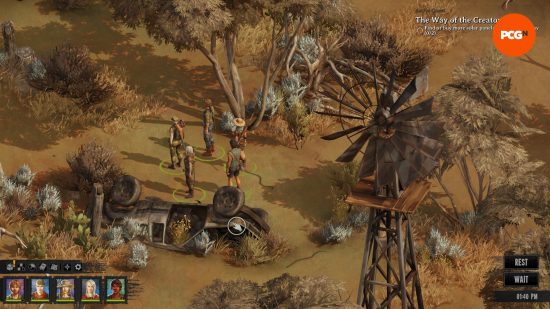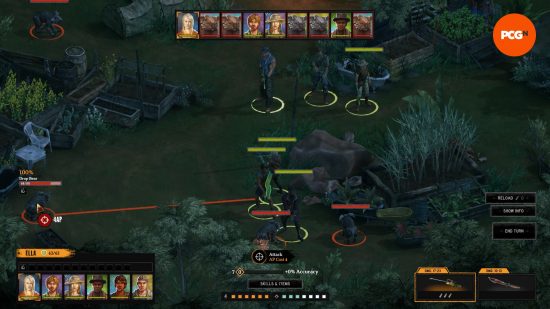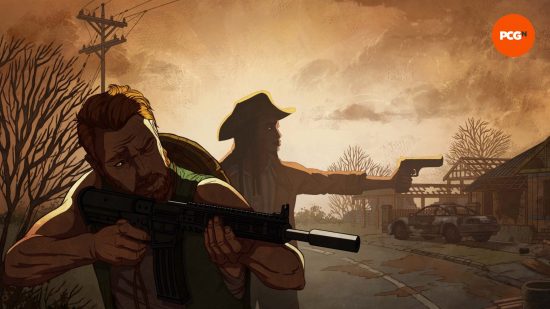Our Verdict
Despite the promise of its setting and philosophically informed morality system, Broken Roads fails to set itself apart from or come remotely close to matching the many post-apocalyptic games it’s inspired by.
We always return to the apocalypse. For decades, and over nearly as many years of videogames, stories set in the aftermath of a world-destroying cataclysm have captivated audiences. Most of them share the same scoured setting, survivors scrabbling for resources and fighting off bandits, and explore a familiar concept: namely, how do our personal values and social ideals hold up in the most extreme situations imaginable? The latest comes from Broken Roads, Drop Bear Bytes’ debut release.
Taking place long after nuclear explosions killed the majority of Australia’s population, Broken Roads is an RPG reminiscent of the original Fallout and Wasteland games. It tasks you to navigate a fragmented, recovering society while on a mission to find a new place for your character’s recently displaced community to call home.
It’s rendered in static hand-drawn backgrounds with polygonal models of the cast moving around on top of it, character portraits, and the occasional splash screen featuring flat, thick-lined comic book-style illustrations. These visuals, like the game as a whole, are usually serviceable but far from distinctive. Most of Broken Roads consists of the same sun-soaked vistas of scrub-dusted sand, its towns all crumbling brick structures and rusted metal debris – excepting a few, like one built around a makeshift elevator surrounded by graffiti-painted walls or a well-preserved village with cobblestone streets set in perpetual twilight.
Before setting out in this world, you must first create a character, selecting their background (as a roving goods trader, say, or hired gun) and starting stats (strength, agility, smarts, and so on) before answering a quiz that categorizes them into one of four moral categories. This leads to Broken Roads’ most unique hook: a moral compass system that tracks your choices throughout the game to reflect your philosophical outlook. Depending on your decisions, often marked by colored dialog choices, the protagonist will be placed on a quadrant that characterizes them as utilitarian, humanist, nihilist, or Machiavellian, with some overlap between compatible philosophies possible on the graph.
While a potentially novel idea, the moral compass’ influence is negligible in practice, basically applying a coat of paint over a traditional morality system. It encourages character creation and role-playing that’s more complex than a simple ‘good’ or ‘bad’ binary, but the pay-off – which includes stat-boosting traits and certain dialog branches – quickly dissipates as the game seldom goes beyond straightforward narrative and combat scenarios.
The combat in question is sound but unremarkable. You stab, pummel, or shoot enemies in turns, using up an allotment of movement and ‘action’ points in a manner familiar to anyone who’s played the many games influenced by modern XCOM’s turn-based fights. Sadly, unlike XCOM, there isn’t much weight given to the importance of battlefield tactics, like character positioning. The party can take cover or flank enemies to mitigate or increase damage received or inflicted, but most of the game’s battlefields don’t offer enough opportunities to do so. Because of this, and a limited selection of character skills that soon reveal themselves as either extremely or barely useful, Broken Roads’ fights become disappointingly rote and unexciting – easy enough to breeze through when unavoidable but too lifeless to be truly enjoyable.
If the game’s story was stronger, these kinds of issues could fade into the background. Broken Roads’ plot, though, just isn’t exciting. It has little momentum beyond an initial set-up that demonstrates the inhumanity possible in its setting with a violent town raid. For much of the game, the player wanders from one settlement to another and talks at length with characters defined more by archetypes – friendly, rude, ruthless, compassionate – than any believable personality. The intent is clearly to explore moral philosophy through the ultra-dire, ultra-dramatic circumstances of surviving in a wasteland, but most of Broken Roads’ dilemmas are too familiar to be of interest. In one, you may need to decide whether to help a potentially terminally ill person escape a dangerous location or leave them behind to pack more life-saving supplies into a vehicle. In another, you’re presented with the choice of either supporting a strong-armed leader capable of protecting a community from outside attack or ultimately undermining them to create a more equitable society.
These are all well-worn post-apocalyptic thought experiments, and they’re explored here without creative flair. Philosophical debate should, if it wants to lead anywhere important, entail a flexibility of thought. Broken Roads offers rigid lists of neatly labeled choices instead, restricting inquiry and argument to pre-defined lanes. Its main plot is also too slight, ending anticlimactically as soon as it threatens to enter more dramatic territory.
Further harming the game are glitches that upset the story’s flow and make it unclear if the frequently opaque mission objectives aren’t progressing for technical rather than intentional design reasons. Drop Bear Bytes will likely fix these issues post-launch, but the larger issue is that Broken Roads is too dull to warrant a playthrough even when working as intended. We’ve seen deeper and more dramatically potent examinations of post-apocalyptic morality in other games, from Telltale’s The Walking Dead to Naughty Dog’s The Last of Us, and trawling a wasteland is more enjoyable on a moment-to-moment basis in the Fallout, Stalker, Metro, and Wasteland series. The culturally distinct Australian setting and philosophical focus of Broken Roads may seem like enough reason to return to the post-apocalypse, but there isn’t enough here to make good on its premise.
